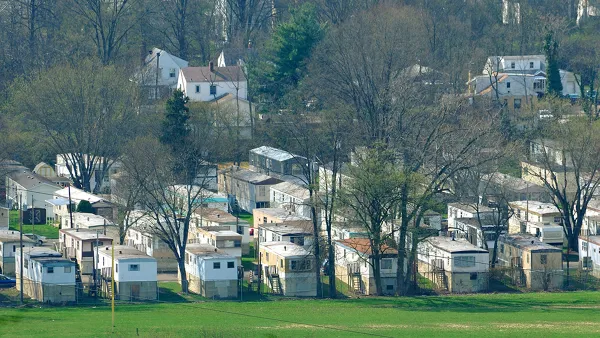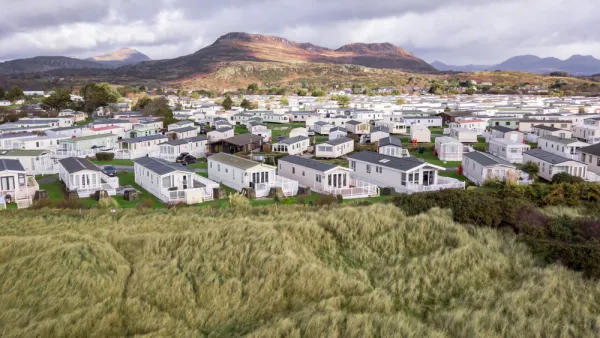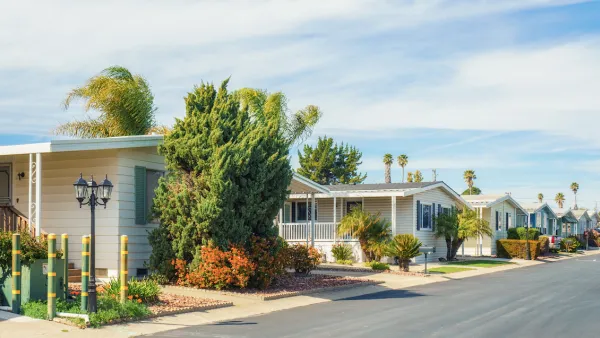Longtime residents of mobile home parks are seeing their land rents go up as corporate investors seek to increase profits, aided in part by federally-backed loans.

Mobile home parks have long served as an affordable option for homeownership for many Americans, with 3 million households residing in manufactured home communities around the country. But more recently, big investors are buying up these parks and raising the land rent, leading to eviction fears for many low-income residents who own their home, but not the land it sits on. Sylvie Douglis reports on the changes affecting residents as ownership of mobile home parks shifts from mom-and-pop operations to real estate investors looking to increase profits with higher rents and new utility fees.
Known widely as "mobile" homes, manufactured homes, in fact, rarely move. The cost to relocate a mobile home runs from $5,000 to $10,000, a price point unaffordable to most owners. "In the past few years, hundreds of parks have been bought up by big corporations" looking to make bigger profits. As rents go up, the park's value rises, and "the investor then refinances the mobile home park and takes out a big loan" at a low interest rate–largely thanks to federally backed Fannie Mae and Freddie Mac loans. Despite their stated goal of helping more people afford homes, these agencies provided over $5 billion in government-backed loans to big mobile home park investors last year alone.
Meanwhile, residents who want to buy their own land struggle to get federal assistance. Although some states have a "right of first refusal" that gives residents the right to buy a mobile home park when it goes up for sale, "when the residents of a mobile home park want to buy their own park, they almost never get a super cheap loan backed by Fannie and Freddie, generally because the co-ops don't have the cash for a big enough down payment." Changing this, says Andy Danforth, "would change the game. Residents could get easier access to loans at much lower interest rates, so they'd be more able to afford to buy up their own parks. A lot more parks could turn into co-ops."
FULL STORY: Mobile Home Parked

National Parks Layoffs Will Cause Communities to Lose Billions
Thousands of essential park workers were laid off this week, just before the busy spring break season.

Retro-silient?: America’s First “Eco-burb,” The Woodlands Turns 50
A master-planned community north of Houston offers lessons on green infrastructure and resilient design, but falls short of its founder’s lofty affordability and walkability goals.

Delivering for America Plan Will Downgrade Mail Service in at Least 49.5 Percent of Zip Codes
Republican and Democrat lawmakers criticize the plan for its disproportionate negative impact on rural communities.

Test News Post 1
This is a summary

Test News Headline 46
Test for the image on the front page.

Balancing Bombs and Butterflies: How the National Guard Protects a Rare Species
The National Guard at Fort Indiantown Gap uses GIS technology and land management strategies to balance military training with conservation efforts, ensuring the survival of the rare eastern regal fritillary butterfly.
Urban Design for Planners 1: Software Tools
This six-course series explores essential urban design concepts using open source software and equips planners with the tools they need to participate fully in the urban design process.
Planning for Universal Design
Learn the tools for implementing Universal Design in planning regulations.
EMC Planning Group, Inc.
Planetizen
Planetizen
Mpact (formerly Rail~Volution)
Great Falls Development Authority, Inc.
HUDs Office of Policy Development and Research
NYU Wagner Graduate School of Public Service





























